Doulas say new Medicaid policy supports their work, but not them
Women and infants’ health advocates around Michigan are celebrating a new policy that will allow pregnant people covered by Medicaid to pay for the services of a doula.
The policy, enacted Jan. 1, puts Michigan on the list of just a handful of states that cover doula services, which have been shown to improve birth outcomes and decrease health and racial disparities. But doulas themselves, severely disappointed in the reimbursement rate set by the state, say while the policy may be good for pregnant people, it’s unsatisfactory for them.
“We will not have the ability to support the people who need it the most,” said Melinda Britton, owner of Doulas of Marquette in the Upper Peninsula, who says the state’s reimbursement rate will force doulas to make choices about how many Medicaid clients they can afford to take on.
“I think it’s beautiful that … they’re seeing the value to incorporate doulas into that support for families. I just would love to see them also support the doulas.”
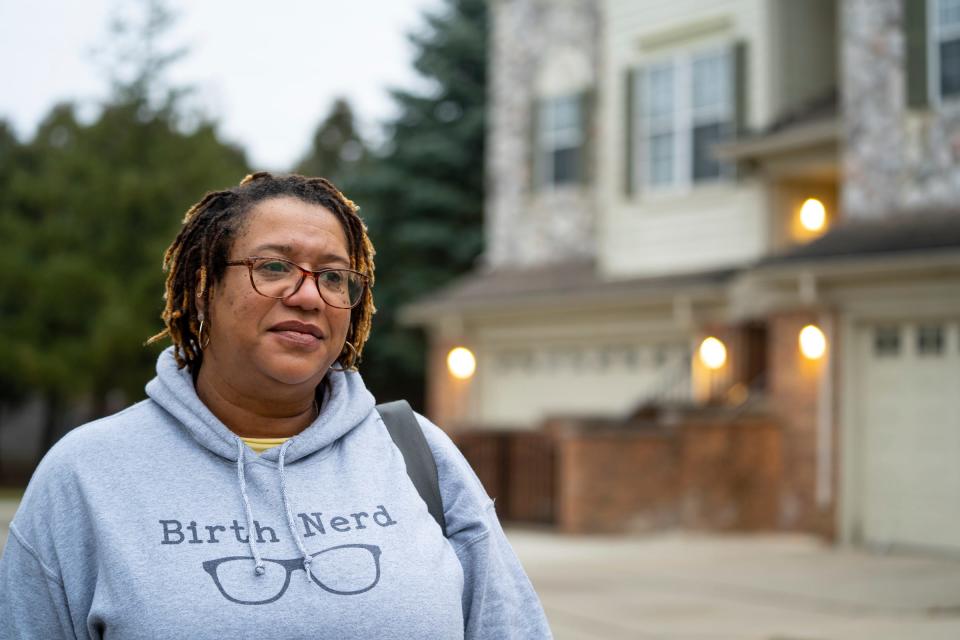
What is a doula?
A doula provides continuous one-on-one physical care during labor, as well as information and emotional support for months before and after birth. Using a doula has been shown to improve birth outcomes for both mothers and babies, from lowering rates of cesarean sections to boosting infants’ Apgar scores, which reflect their health immediately after birth.
Most say they also serve to lift up the voice and wishes of the birthing person, who may not always feel comfortable expressing them or who might be unable to do so during labor.
For Black, indigenous and other women of color who feel unseen or unheard by the medical community, having a doula present is also a measure of protection against racism that has been proven to increase maternal and infant mortality.
“We're there to just give them the tools that they need to navigate their voice in that space,” said Shanayl Bennett, a doula and organizer with Mothering Justice. “And that's so important when it comes to birthing experiences and birthing outcomes because a lot of times birthing people are told what to do; they're not allowed to express how they truly feel or what they truly think.”
More:Michigan pediatric palliative care doctors help make short lives 'a good journey'
More:When giving up a child is the only way to get needed help
Black women are 2.8 times more likely to die from pregnancy-related causes
Nationally, Black women are more than two times as likely as white women to receive late or no prenatal care, and their babies were more than twice as likely to die as infants. Black infants are four times as likely to die of complications related to low birthweight than white babies.
Though Michigan’s maternal mortality rates are very low, the state has one of the highest death rates among Black pregnant people in the nation, according to the National Women’s Law Center.
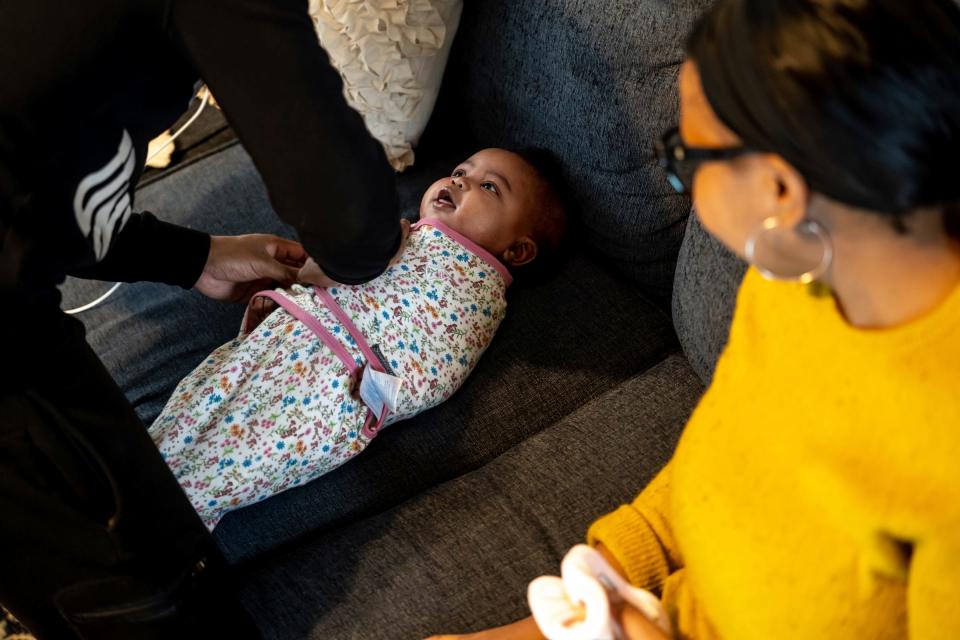
“We looked at the data; more than 63% of maternal deaths in Michigan are preventable. Black women are nearly three times more likely to die from pregnancy-related causes than white women,” said Farah Hanley, Michigan’s chief deputy director for health. “By providing doula services, we’re really helping to address those health disparities.”
DHHS stepped in after legislative efforts failed
In Michigan, 40% of births are financed by Medicaid — more than 41,000 of the babies born every year. Pregnant people are eligible for Medicaid if they make 195% of the Federal Poverty Level — up to $26,500 for a single mom-to-be.
State Sen. Erika Geiss, D-Taylor, proposed legislation in 2020 that would have provided expectant mothers on Medicaid with comprehensive doula services. The bill never made it to a vote. But the Michigan Department of Health and Human Services began work instead, creating the Medicaid policy and announcing plans for a doula advisory council and registry of enrolled doulas.
“After several attempts at legislative action that was consistently stymied by previous legislatures — bills that I introduced — I am absolutely thrilled that this action has been taken,” Geiss wrote in an email to the Free Press. “It shows a commitment to improving infant and maternal health in communities of color, shows that the administration and DHHS have listened to the various stakeholders that over the years have been working to achieve this.”
The state may have listened, but doulas don’t feel heard
In its initial proposal, the state proposed a reimbursement rate of $350 for a doula to attend a birth. Around 100 doulas from diverse communities signed an open letter in response, saying that rate was “so drastically low that we can only assume that the State has a fundamental misunderstanding of the support provided by doulas.”
Doulas pointed out to DHHS that many births require hours, and even days, of labor. They reminded that doulas provide anytime call and text services for anxious pregnant and post-partum people who turn to them for advice on anything from when to go to the hospital to breastfeeding support.
They urged policymakers to consider the fact that the nature of their work can mean paying other doulas to be on-call as backup; unlike physicians and nurses in a hospital, doulas can’t pop in and out of a room and help a few people at a time. This is constant, personal, intimate work.
DHHS raised the amount it would pay for attending a birth to $500, and held a second public comment period, which Hanley says is atypical.
More:Metro Detroit hospitals welcome newest additions
More:Dearborn employee takes first paid maternity leave in city's history
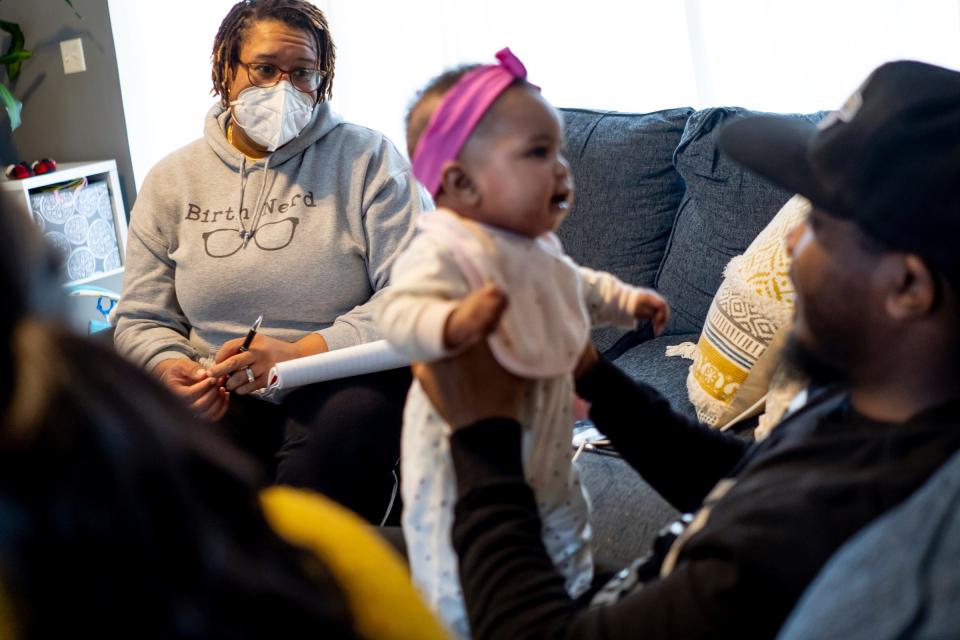
Doulas urged DHHS to listen
Organizations of Black and indigenous birth workers provided their input, and a collection of doulas wrote another letter to the state.
“Hear us,” the second letter, signed by more than 200 doulas, urged. “We are the experts on our work, understand the needs of under-resourced and at-risk families, and have a vested interest in the long-term success of a Medicaid program for doulas, including the likelihood of uptake by doula providers.” They called for a birth fee of $1,200.
“Michigan has an opportunity to do this right from the beginning and to be a leader and a model nationwide,” they wrote.
The state bumped its reimbursement fee up to $700.
Jessica English, owner of Birth Kalamazoo, says that fee still is “not adequate to account for the intensity of what we do.”
Erika Millender, a Detroit-based birth and postpartum doula, agrees. “It does seem at this point like a token of reimbursement,” she said, pointing out that doulas can take only a few clients each month to ensure they can be there when a client goes into labor. “It doesn’t really put us in a spot where we feel that we can safely sustain our own livelihoods with that.”
Hanley says she’s surprised to hear doulas aren’t satisfied. “I think we’ve landed on a number that is reasonable and really reflects the range of services provided,” she said. “We’re really comfortable with it, and we did it transparently.”

What should Michigan be paying doulas?
Amy Chen, senior attorney with the California-based National Health Law Program and leader of its Doula Medicaid Project, puts the baseline reimbursement package doulas should receive as fair compensation for their services at $1,500.
“I’ve been really encouraged to see states like Rhode Island, certainly Oregon, D.C., really take up the mantle of equity, not just for Medicaid enrollees who are going to be getting the service but also for the doulas that are providing the care,” she said. She pointed to Oregon as a cautionary tale; that state was forced to raise rates twice after the number of submitted claims remained extremely low for years.
Chen says it’s too early to say whether Michigan’s overall $1,150 rate — the $700 base plus up to six pre- or post-natal visits at $75 each — will result in uptake by doulas.
Will the policy lead to better outcomes and more equity?
Since doulas do help improve birth outcomes, English said she does think Michigan’s new Medicaid policy could make a dent in its health system disparities. “However,” she said, “I'm also a little wary of this big, entrenched problem being laid at doulas’ feet.”
“This needs to be a systemwide reinvention to address the inequity, and doulas are a piece of that, but doulas are not the whole of it,” she said. “We can't reinvent the system just by being in that space.”
Elon Geffrard, co-founder of Birth Detroit and a birth doula who focuses on serving Black women, echoes her sentiments. “Doulas are part of the lever,” she said. “But we’re not the silver bullet.”
More:Inside Detroit's 24-hour child care: A fragile lifeline for working parents
More:Growing number of grandparents face crushing costs as they raise kids
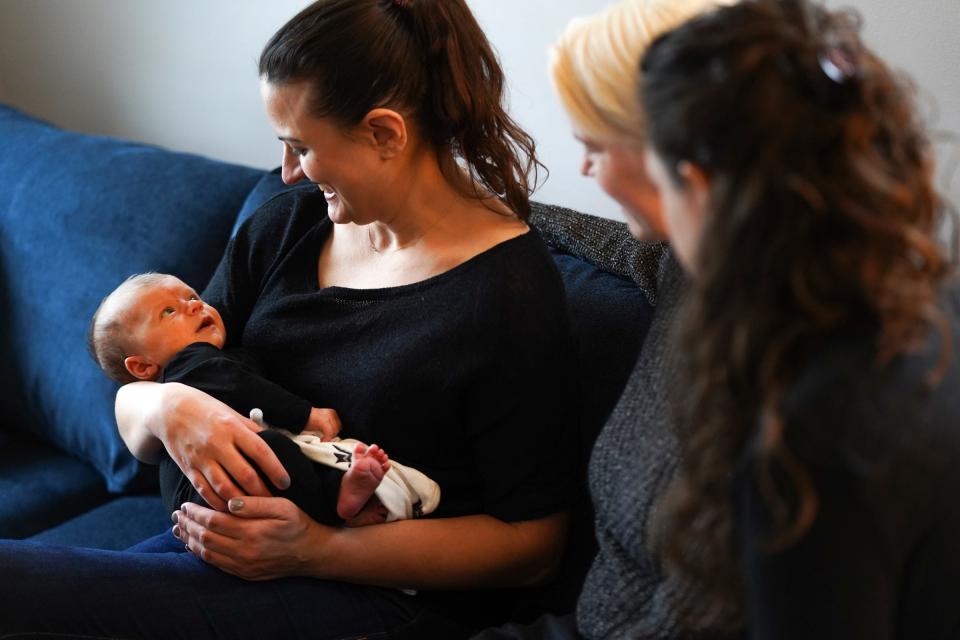
“It may not be feasible for doulas to work at this rate”
Many doulas shrink at the prospect of turning away clients in need but aren’t sure how the rates they’ll be reimbursed under Medicaid can sustain them.
“I’m certainly grateful for the people who were behind this,” said Kirsten Johnson, a doula based in Detroit. But Johnson, along with hundreds of other doulas in the state, isn’t sure how many of her counterparts — especially those with significant experience who charge more than the policy will reimburse — will choose to accept Medicaid.
“While we say all the time that we wish we could do this for free because we think everyone can benefit from having a doula, as business owners of course we can’t,” she said.
Doulas deciding whether to accept Medicaid clients may also not want to contend with what could be an onerous administrative burden, which English says could potentially tip the scales.
“Most doulas are in a cautious wait-and-see mode right now,” she said. “Because if you're already paying less than the current doula rates statewide, and you're significantly increasing paperwork and billing burdens, it may not be feasible for doulas to work at this rate.”
Next steps for doulas who are doing their 'heart’s job'
Hanley said the state currently has no plans to renegotiate the reimbursement rate. But on Jan. 13 DHHS announced that Chief Medical Executive Dr. Natasha Bagdasarian had issued a standing recommendation that "doula services are medically necessary and should be offered to families covered by Medicaid insurance," thus rendering the federally mandated requirement to get a referral for doula services from a health care provider moot.
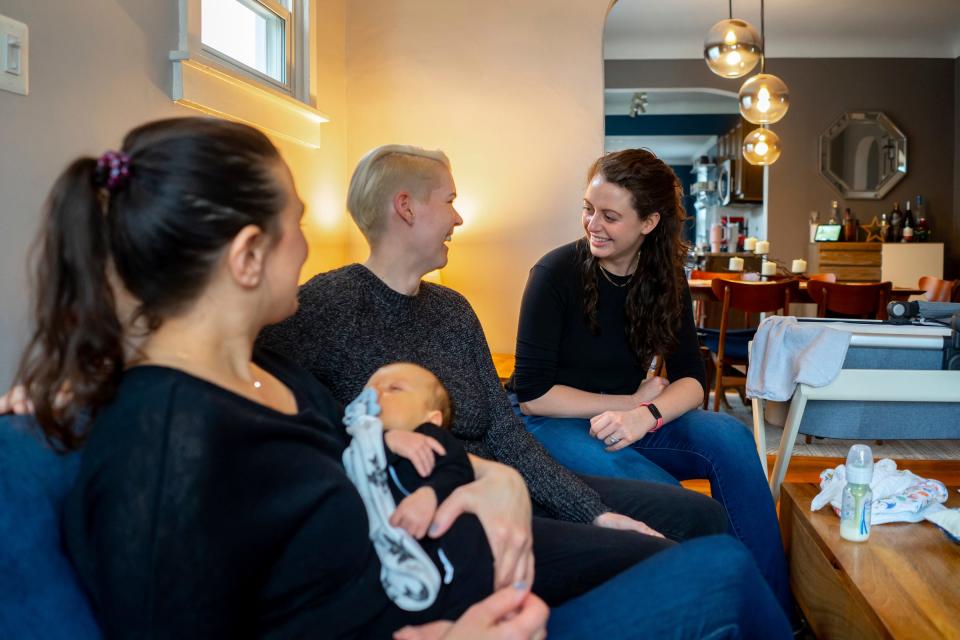
This will come as good news to doulas around the state, who remain hopeful that Medicaid’s decision will spur private insurance companies to follow suit and reimburse for doula services. Rhode Island is currently the only state to require it.
While they continue to advocate for higher reimbursement, Millender says many doulas will keep serving clients who can’t afford to pay full price. “We know there is a great need and it’s not easy to just walk away from that,” she said. “Especially if it’s your heart’s job.”
Jennifer Brookland covers child welfare for the Detroit Free Press in partnership with Report for America. Make a tax-deductible contribution to support her work at bit.ly/freepRFA. Reach her at jbrookland@freepress.com.
This article originally appeared on Detroit Free Press: Doulas: New Medicaid policy supports their work, but not them

